#symbolic killing of the self etc etc etc
Explore tagged Tumblr posts
Text
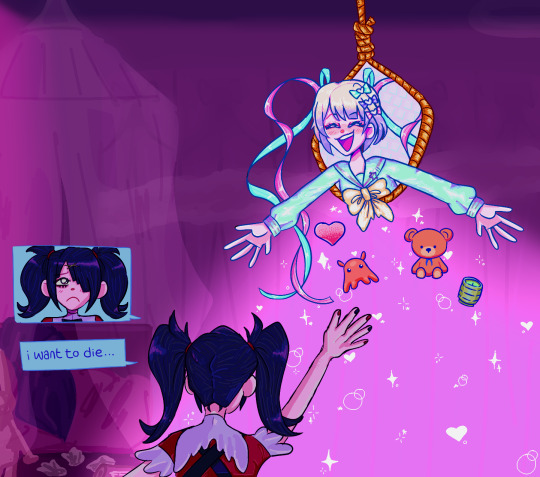
INTERNET OVERDOSE
#illust#needy streamer overload#needy girl overdose#ame#ame chan#kangel#omgkawaiiangel#nso#ngo#symbolic killing of the self etc etc etc#dont look too hard at the bg okay? i dont really do bgs gsdhg
41 notes
·
View notes
Text
It kinda irks me when people call Black Mask "Truekechi", because that's not really the case...? Not entirely, at least.
I mean yes, of course, Black Mask IS a part of Akechi's personality, I'm not denying that. The thing is, that it isn't Akechi's WHOLE personality. This kid just went through the biggest crashout of his life, his whole plan he's been meticulously working on for years failed, and the worst part is that it didn't even lead to what he was after, so he didn't even get the revenge he wanted. Of course he's unstable and edgy, I mean, who wouldn't be?
That is not to say that his anger and edginess aren't a part of his "true self"; I'm sure that his glee at taking out shadows is absolutely real, for example, but I believe that it comes from him just being angry in general- at Shido, at Maruki, and at himself. Akechi is rough around the edges, has a short temper and has a tendency to look at others from above, but the situation he's in boosts these parts of his personality as a sort of defense mechanism.
I think that his mementos conversations give a really good insight into this too; Perhaps it's due to my older age compared to the characters in-game, but a lot of Akechi's lines feel so... Forced on his side? He's the one to bring up that other Thieves probably don't want to have him on the team, or that they're unsettled by how he fights, but nobody even said anything about it in the first place...? Even other characters seem kinda done with his act, either that or they accept him being on the team due to their shared goals; Some are even quite nice and friendly, all things considered. This just feels like Akechi's self-loathing twisting itself into this kind of quips because he himself doesn't want to get too comfortable on the team; He's scared of growing closer to the other Thieves, so he tries to keep them at arm's length. He can't just tell them "I think I'm a horrible person" straight up (his pride wouldn't let him), so he has to make himself "unappealing" in other ways.
There's also the other side of these conversations, where you can see him just... Being a kid. He whines about being hungry, or thirsty, or his legs getting stiff in the car, he talks about mundane things with other Thieves like graduation or sports... He's just a teenager as much as his teammates are- it's just that the others weren't hired as assassins at 15 and didn't grow up obsessed with the plan to kill their father. His emotional development and maturation process have clearly been impacted, on top of everything else he had to deal with. So he may act "adult" and more mature than others at first glance (at least before he reveals Loki), but inside he is just as much (if not more, in some aspects) of a kid as the other Thieves are. This means that he is still at the age and mental development level where he is still figuring out himself, who he is, what path to follow etc. It also means that he is prone to being overly dramatic, emotionally extreme, and have poor emotional control- you know, teen stuff.
The key to it all becomes his ultimate persona, Hereward. We all know that Akechi has two personas, but he doesn't get two ultimate personas, he gets only one. I think that it's symbolic of his psyche slowly melding itself into one again. It's not that either one of his "sides" was truly fake or real; Both the Detective Prince and Black Mask ARE parts of the "real" Akechi- it's just that he has been systematically compartmentalizing his whole self into two for YEARS. The awakening of his ultimate persona is him starting the process of healing and allowing these two sides of him to mix and reconnect back into one.
I honestly think that, with enough time and the right environment, Akechi's most extreme traits would even themselves out, and he would stop being AS short-tempered, snarky, and blood-thirsty as he is in the game. He will never be the perfectly plesant Detective Prince, but he also won't be the angry, self-loathing and vengeful Black Mask. He will be something new, something different, a fusion of the two opposite ends of his personality spectrum. Only then he will live as his fully true self.
#persona#persona 5 royal#persona 5#p5#p5r#goro akechi#hatter blathers#i saw too many people just accept without question that black mask is akechis real personality when it ISNT!!!!!!#not entirely#i also want to highlight that too many people overlook the fact that the whole gang are teenagers#with all the things it entails#including being edgy to mask self esteem issues and not having good emotional control#with akechi especially people tend to not consider it when talking about him. they just see his anger and self loathing#and think thats all there is to him#like NO! you gotta look even DEEPER!!!!! thats not NEARLY everything there is to him!!!!!!#i hope that i didnt omit something that was said/done in the canon#like i always say- this canon is HUGE and i feel like its easy to overlook some small elements
474 notes
·
View notes
Text
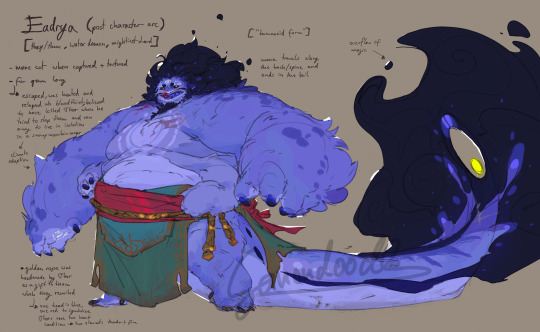
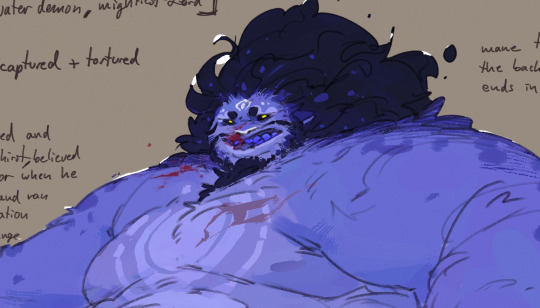
( OC, Eadrya, they/them, water demon )
"Oh don't look at me like that, is this the first time you've drawn blood or what? do it again! had a nice sting to it-" (Eadrya to Shargon, likely the first time Shargon's ever dared to fight them instead of fleeing immediately like his life depended on it ... bc it did)
finally gave Eadrya their deserved post character arc design (instead of doing what i should be)
since i know my handwriting isnt always readable, heres a short an overly long explanation of the context (oops)
(recap, the demon world was invaded and is believed to be destroyed, Eadrya lost a fight for the first time in their life to a celestial and survived by sheer luck and kindness of a little fishing village in the human realm, which kind of broke their pride and kickstarted their arc- (here i drew the lady in charge of the village before, though Eadryas design here is also a little out of date again ..)
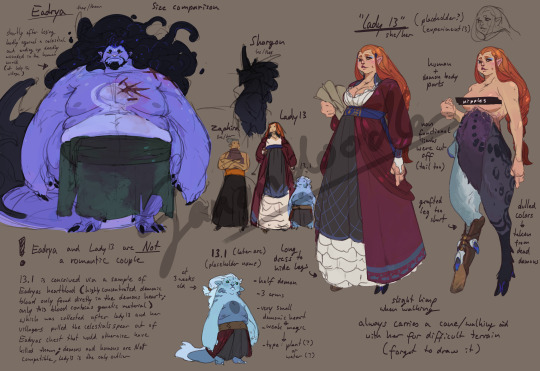
-skipping alot in between that and the end of their arc bc that would jsut be too long for this post)
Eadrya helped other Lords and Shargon (with Midas and Idri) escape from a trap set by hunters but was captured themself, since it was the first time hunters managed to catch a Lord they 'researched' alot about demons using them .. by torturing them (demons are not considered sentient by people at large)
they managed to escape but were hunted down immediately, even Eadrya with their immense magic overproduction and abillity to recover was too drained (both literally of their strength -since the most effective way to hurt/immobilize a demon is draining them of their magic/blood faster than they can recover it- AND mentally) to easily avoid them and instead turned to killing, making them relapse into their old bloodthirst which lead to them spiraling into thinking that it is all they are ever good for and they will never be able to change-
Thor (with Idri) were on their way to free them after being informed of Eadryas capture ( Thor is Eadryas best and only friend ) but when they arrived it had already escalated so far that they went after killing Thor as well, now firmly believing Thor was never their friend but was simply trying to tame them out of fear of their power (not completely wrong ..). despite Thor with his two hearts being able to give Eadrya a second chance they decide to go for killing him twice, unintentionally missing the second time but doing enough damage for Thor to .. essentially fall into a near death condition; thinking they actually killed him everything starts to fall apart further as they realize over time they have changed after all but it is too late now-
Eadrya then flees into a snowy mountain range far away and lives there in complete isolation for several months (as a sort of .. self punishment and convinced of that being the best choice for everyone, they are a danger, they have no one left anyway etc trying to cope with it all) and thus grows out their fur (yes they always had fur, just short and slick like a seals fur) which they keep even after reuniting with Thor and everyone else later down the line
(the golden rope they wear in the picture was made by Thor during the time he was recovering and searching for them with the solar pirates (long story..), its not a good quality but he tried his best ... the two beads on it symbolize Thors two hearts (thunder and fire, blue and red)- Eadrya treasures it dearly)
so funnily enough, despite looking much wilder now they are actually much better in their self control and general health :P
#ganondoodles#art#original art#OCs#original character#character design#monsters#hello here i am again wanting to do a little doodle and then writing a badly summarized version of one of the best arcs in this story#for two hours straight bc summaries are not my strength lmao#either way ...... it made me draw so uwu#i love this guy (gender neutral) so much#did i ever mention that Thor has a bit of a one sided crush on Eadrya? .. well now i have#its complicated though bc Eadrya is my most aro/ace character in existence fjdkfvnhkdjfhvdjk#and i say MOST bc in a way all my characters are some flavor of aro or ace - who would have thought#(that doesnt mean you arent allowed to find them hot btw ... neither me being aro/ace nor my ocs being that means it)#(im always worried about people thinking that they cant say what they think trying to be considerate -appreaciated- but not necessary)#anyway sorry to come out of nowhere with this fnjkdbnfkdbgfvdj
201 notes
·
View notes
Text
᭓ ྀུ༺ a degree theory by nikola stojanovic

please read before proceeding
important note: this is not my info. this is all from nikola stojanovic’s theory on degrees in astrology. he has books on it that i think you can find online and download for free
trigger warnings: murder, car crashes, sex, and suicide


sign degrees
zero degrees: 0°
the same characteristics as the sign it’s already placed in. example - aries venus at 0° is purely an aries venus, obviously aside from the house energy
aries degrees: 1°, 13°, and 25°
beginnings, leadership, taking action, fighting spirit, not giving oneself up to fate, struggle, war, abuse, labor, diligence, etc
taurus degrees: 2°, 14°, and 26°
food, money, stability, earth, luxuries, sound of voice, singing voice, etc
gemini degrees: 3°, 15°, and 27°
communication, self-expression, technology, books, siblings, neighbors, etc
cancer degrees: 4°, 16°, and 28°
home, traditions, nurture, loyalty, faith, mother, the ocean/water, etc
leo degrees: 5°, 17°, and 29°
life, children, attention, fame, creativity, strength, happiness, light, etc
virgo degrees: 6° and 18°
improvement, health, to diminish, routine, animals, acts of service, etc
libra degrees: 7° and 19°
harmony/fairness, charm, beauty, law, music, art, dancing, pleasures, etc
scorpio degrees: 8° and 20°
death, major transformation, wealth, jealousy, sex, secrecy, taxes, etc
sagittarius degrees: 9° and 21°
wisdom, abundance, college, travel, photography, success, beliefs, etc
capricorn degrees: 10° and 22°
hard work, fear, public attention, karma, father, boss, isolation, history, etc
aquarius degrees: 11° and 23°
unexpected experiences, technology, friendships, networking, divorce, etc
pisces degrees: 12° and 24°
spirituality, escapism, dreams, illusion, the sea, mysteries, the hidden, etc


special degree meanings
supreme power: 2°
this degree is often found in the charts of people with remarkable achievements, who had extreme power, and who were highly respected according to nikola’s research
eroticism/a fun life: 5°
many sex symbols like marilyn monroe have this in their chart. nikola believed this was the best degree in general as well. he thought it indicated lots of fun and pleasure in one’s life
suicide/divorce: 11° and 23°
according to nikola the aquarius degrees (11 and 23) both indicate divorce occurring when placed in prominent positions in the chart. 11 is the only one indicating suicide though
car accidents: 15°
nikola believed that when this degree was connected to 8th house or scorpio placements it could indicate getting into car crashes
pure evil: 18°
nikola believed that this degree indicated a negative destiny for someone. he thought it was the worst degree you could have in your chart, based on his research he thought it was solely about facing hardships and nothing more. he also believed it could indicate being an evil person with no good intentions
to kill or be killed: 22°
just as the title reads, nikola believed this degree indicates being killed or being a killer. another thing he believed it could indicate was abandonment in the area of life it’s placed
clairvoyance: 29°
nikola believed this degree indicates someone that has very good intuition and can make accurate predictions about the outcomes of events


my opinion on astrology degrees
i personally don’t believe in nikola’s theory 100%, although i do think there’s accuracy to the signs being associated with specific degrees. i have always had stronger belief in my numerstrology degree theory than anything when it comes to this subject though. i definitely do not believe 18° is fully negative like he claims since the universe is yin yang so there’s always both positive and negative ways things can manifest. these are just my thoughts though

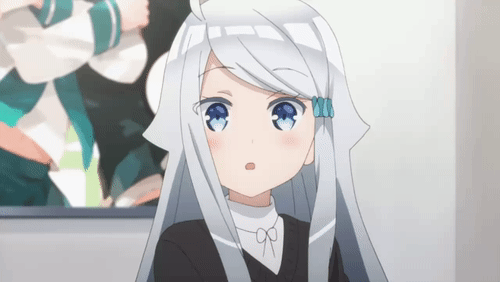
do you believe nikola’s degree theory? comment below!
#nikola stojanovic degree theory#nikola stojanovic#degree theory#astrology#astrology blog#astrology chart#birth chart#astrology community#astro community
457 notes
·
View notes
Text
How Do You Solve a Problem Like Capitalism?* - A Defense on "Squid Game 3" That No One Asked for
*(to the tune of "How Do You Solve a Problem Like Maria?" from "The Sound of Music").
I've been gathering my thoughts about the ending of "Squid Game", and after sleeping on it, I have come to realize that I still don't mind it at all, lol. I think most of the things I'm going to say here, I have shared them before, either here or on Discord, so please bear with me.
First of all, I get people's frustration, because there are things I wish I could change as well. I wish the 457 confrontation had been longer. I think the Sky Squid Game round spends too much time (Ep.5), even though I think it's a depiction of governments everywhere, where middle-aged men, some of whom are criminals, decide who gets to live and die. I wish Junho had killed the VIPs. And tbh, I wish In-ho had been dead.
Before we go any further, I want to iterate that while there's a "Defense" in the title above, I'm not trying to change anyone's mind about the finale. I think two things can be true at the same time. I think it's right to feel disappointed/angry/frustrated about the season, while finding a positive twist in it.
Maybe I have deluded myself into thinking this lol, but I believe I understand where HDH is coming from. For me, it started when his NYT interview was published, and he said that the baby was a symbol for humanity at its core. I was, like, "Uh oh. Gi-hun is going to either sacrifice himself or someone else for the baby." But doing the latter would be an antithesis of his arc, so the first would be much more probable. Even without the interview, though, I'm sure many people have anticipated his sacrifice. But now, the question is: Is it worth it?
For me, that depends on how one looks at his sacrifice. There's one possible answer: His death doesn't stop the game, so it's pointless. And one may think this way because one sees the bigger picture. However, I think there's another answer, which one will get when one looks closer and steps into Gi-hun's shoes. You see, while Gi-hun rejoins the game planning to stop it, I think his motivation has changed by the end. He accepts that he's only one individual, and he cannot destroy an entire system alone. He's tried and he fails.
But this is what he can do: He can make a difference for at least one other person, and that's what he achieves through his sacrifice. He's not the only one who does this. Hyun-ju dies because she's the selfless person that she's always been, and in doing so, she dies for Geum-ja and Jun-hee. Geum-ja's death serves as a wake-up call for Gi-hun. Jun-hee dies for the baby.** And Gi-hun dies for the baby, too, I suppose? But also! For himself (more on this later). And for In-ho, because I believe Gi-hun starts to change him, and we can see this from the way he goes all the way to see Ga-young in the end.
(**I think the critiques about the treatment of these women are valid. At the same time, I do think that the women having three different keys and helping each other out until a man/myunggi ruins everything is supposed to be a depiction of an ideal society. The future is female, etc.)
But yes, back to Gi-hun dying for himself. I believe his choosing to die the way he does is him dying on his own terms. He doesn't let the guards or In-ho take him out. He dies by his own hands. I believe that for him, his death is not pointless nor wasted because he does it to save the baby/humanity and, therefore, himself. He dies with his humanity still intact. And again, even though he doesn't know this, he may change In-ho.
And one may ask: Why, though? And frankly, I have asked the same question myself, lol. I've seen some people blame Netflix, and I want to say I agree with them, lmao.
Here's the thing. We've always known that Gi-hun is HDH's self-insert and "Squid Game" is his anti-capitalist manifesto. But due to the global success, he is trapped inside a gilded capitalist cage. He has to watch his life's work get turned into a cash grab, not just by Netflix but also by people like Mr. Beast. He probably doesn't have any say on the upcoming spin-off(s) because Netflix owns the rights to "Squid Game", which means they can do whatever with it. I can see why HDH sees that there is no end to this capitalist hell. It's why I think there's a taste of his hopelessness in this ending (I think he also has zero trust in the police force, justice system, and authority in general, but that's a topic for a different post). He really doesn't see the game or this big capitalist machine stopping, I think. Not any time in the near future, at least.
That's why I think killing Gi-hun is important for him. I believe that just like Gi-hun protecting the baby/humanity, killing Gi-hun is HDH's way of protecting his own humanity in the face of never-ending capitalism, which I'm sure is very tempting to him. It's also a way for him to prevent Netflix from owning Gi-hun and milking his character, putting him into their spin-off(s).
So, if we ask HDH: How do you solve a problem like capitalism? I think he doesn't know either. I don't think he has a solution. I think, like Gi-hun, he started out wanting to change the world. But along the way, his dream changed. He no longer wants to change the world; instead, he hopes to change at least one person for the better. And he's said something like this several times, that he wants viewers to seek the solution for themselves. He wants us to fill in the blanks ("Humans are ___"). He wants us to start from ourselves by not letting go of our humanity. I think there's a reason why Gi-hun dies with his eyes wide open (because he's woke, lol). I think he believes that a change eventually depends on an individual’s ability to “stay woke” and not be swayed by others who want to erase their humanity.
I think he wants us to be Gi-hun for ourselves and then for everyone else. Because only when there are enough Gi-huns in the world can "we" win against "them". This is not to say that we have to die or sacrifice ourselves for others, but... Hmm... I don't know. But we've all seen what Gi-hun is like. Maybe when faced with a moral dilemma, we should always ask ourselves: WWSGHD? What Would Seong Gi-hun Do?
TL;DR I think "Squid Game" doesn't offer a clear solution to capitalism because the creator behind it doesn't see any, but what he wants to convey is that this doesn't mean we have to succumb to it, because there's always an option to choose humanity. Instead of wanting to change the world, he hopes to change at least one person for the better. And so should we. And everyone can do this by starting with themselves and trying to be a Gi-hun, not just for their sake but also for others'.
That's all <333
97 notes
·
View notes
Text
I feel like people really underestimate the importance of Dick being the first Robin. Like, reverse Robin AUs are interesting and such, but I just hope people realize that in the context of canon, they would never work. The reason Batman and Robin ever works is because the first Robin was Dick Grayson specifically. Because Bruce would never have taken in any child if Dick's tragedy hadn't specifically happened to mirror his own experience. Dick Grayson was the only one Bruce truly saw himself in first, because the fundamental event that defines them is the same. And he sees the opportunity to help someone the way he was never helped, to make sure that Dick didn't go down the dark path he did. So, my point here is that the only one Bruce actually made the choice to take in, the only one who could kickstart it all, is Dick Grayson, because he is the only one with whom Bruce could immediately empathize and connect with.
This never happened with any other Robin. He took in Jason because he missed Dick, he took in Tim because Tim forced himself into the role, he took in Steph because he was trying to make Tim come back to being Robin, and Dick made Damian Robin. Of course, he loved all of them, and they all have their unique relationships with Bruce that are very important and inform their characters, and he does need them too. But he specifically formed this connection with Dick that made Dick the only person he ever considered taking in. It took a very specific set of circumstances in Dick's backstory that made Bruce commit an impulse adoption that just isn't really present in any other Robin's story. And the reason Jason or Tim or Steph or Damian or anyone else whom Bruce has taken under his wing even got that chance is because of the work Dick Grayson put into Bruce Wayne.
Before Dick, Bruce was reckless and didn't care at all about himself, to the point of almost being borderline suicidal. He was more brutal, more violent, etc. The reason all this changed, is because of Dick Grayson specifically. He was the one with whom Bruce opened up, with whom Bruce was forced to grow up, to take responsibility and learn to take care of both Dick and himself. Dick, to Bruce was the one who brought "color to their [his and Alfred's] monochrome lives." Dick Grayson's specific brand of happiness and joy changed Bruce for the better. Dick gave Bruce hope. This is true for other Robins too, but only because they followed the precedent that Dick Grayson set, only because they slid into his role (they have their own interesting relationships with Bruce, but this specifically is from Dick that other Robins carried on. A legacy, if you will). Dick Grayson turned Bruce into the kind of man who would become a serial adopter.
Without his influence, without his precedent, there would be no Batfamily, because Bruce would never have gotten to the point where he would be able or willing to take in someone else and care for them properly (It took living through his trauma again to get him to take Dick in lmao). Hell, there would be no Batman because Bruce would have gotten himself killed a long time ago if Dick hadn't helped him learn self-care. Dick knows Bruce best, because he understands him on a fundamentally deeper level than anyone else in the world. And he's the only one who can make Bruce open up at his rawest, most downtrodden state. He is the only one who can give Bruce at his lowest that kind of hope. There is no Robin without Dick Grayson. It's literally a tribute to his parents, using their colors and the name his mother called him. He created that identity as a symbol of hope. He helped Bruce become the kind of man who could and would let other people that he had to care for into his life. Without Dick Grayson, you can simply forget about any other Robin or the Batfamily as a concept even existing.
#DC#DCU#DC Comics#Bruce Wayne#Batman#Dick Grayson#Jason Todd#Tim Drake#Stephanie Brown#Damian Wayne#Nightwing#Red Hood#Red Robin#Spoiler#Robin#The Batman 2022#Robin I#My meta#Meta#TL;DR Dick Grayson is the only one who is emotionally intelligent enough to be an emotional crutch to pull Bruce Wayne out of the darkness#And without him Bruce never would have taken in anyone else#This post is mainly about The Batman 2022 btw#I see a lot of people asking for Robin but they want Jason to be the first Robin for some reason#And that's interesting but Bruce doesn't need just a Robin. He needs Dick specifically#That's what's best for his character progression and it makes the most sense from a thematic perspective too#But that's for another post
593 notes
·
View notes
Text
A Jedi's Weapon
I've been thinking about Lightsabers recently. Everyone knows them, everyone likes them, and I'm pretty sure everyone reading this wanted one when they were a kid. But lately, I've been thinking about what they represent.
Lightsabers are weapons, yes, but it's not their only function. They are useful tools, and not only in combat, but in everyday life to light fires, to cut down the branches of trees when your travelling through a forest, etc. But most of all, I like the symbolism and the meaning they have for the people of the galaxy.
Everyone can pick up a blaster and shoot. And although aiming is harder, it's nowhere near the level of difficulty that achieving mastery in lightsaber combat is. Lightsaber dueling has several forms, all of them unique and useful depending on the situation and the individual, which is amazing if you think about it hard enough.
Blasters are almost always used to kill. Sure, there are stun blasters, and Jedi do seem to be able to use them when the situation calls for it (Obi-Wan killing Grievous with a blaster in ROTS immediately comes to mind). But, if you want to defend yourself with a blaster, the only thing you can do is shoot back, aka aiming for the kill, kill them before they kill you. That's why Luke using a blaster is portrayed as a sign that he's not a Jedi yet, that's why Ezra using a blaster instead of reconstructing his lightsaber/blaster hybrid is used to signify a dangerous shift in his thinking.
Lightsabers are dangerous, yes, but the greatest danger doesn't come from your opponent attacking you before you can lift your weapon. Even Force-adepts have quicker ways to kill you if that's what they wanted to do (look at how often Vader actually uses his lightsaber in the OT, for example, the only person he kills with it is Obi-Wan and that's because Obi-Wan let himself be killed; very clearly, Vader prefers Force Choking, which is entirely fair).
The greatest danger of a lightsaber comes from your own blaster bolts being reflected right back at you. That is a good incentive to surrender and solve things in relative peace, instead of a firefight. Even if that's not enough to stop you, even if you shoot anyways, it gives you some pause, which a blaster can't do.
When it maims, it cauterizes the wound, which prevents you from dying of bloodloss and makes it easier to find medical treatment (think of Luke in ESB).
When it kills, it kills fast and immediately, if your opponent knows where to hit. (Think of Qui-Gon in TPM, where he gets to say his last words to Obi-Wan and doesn't seem to be in much pain).
Dexter says this, in Jedi Apprentice. What the lightsaber represents to the people. Hope, safety, there's someone to protect us now… unless you are the one opposing the Jedi, of course. No other weapon inspires so much hope and fear.
It's a weapon it takes a lot of time and effort to master. It's almost a self-imposed limitation.
It's a weapon with sacred value, unlike many others. It's a unique weapon connected to its user's soul. It's a weapon which is used to protect, to defend. It's a sword used as a shield.
It's the weapon of a Jedi.
A more elegant weapon, from a more civilized age.
#pro jedi#jedi positivity#star wars#lightsabers#lightsaber lore#lightsabers and blasters#lightsabers vs blasters#jedi culture#jedi philosophy?
220 notes
·
View notes
Note
The amount of stuff Malleus has done and the lack of consequences lowkey leads me to believe that when Twisted Wonderland eventually ends or even before then, he'll pull a self sacrifice (as in sacrificing his own life permanently) or smth, but could I be seeing things wrongly? His character is very weirdly written, so it's super hard to tell what archetype he is, the story themes of his character arc and Twisted Wonderlands story themes in general, where he's heading, etc 🥲 especially with his magic now weakened.

As I stated in this post: “Well 💦 I don’t think Twst will ever fully commit to killing a playable character in the main cast. It’s just not economical for a gacha game to do. You kill off a character permanently? That equates to no more screen time (or at least way less screen time + new content) for that dead character, which directly translates into less merch and less banner sales. NPCs (like some of the parents and generic background characters) are disposable because it does not impact revenue at the end of the day. Main cast members? They have plot armor.”
His magic being weakened doesn’t read to me as a death flag, but instead a way to nerf Malleus and keep him from one shotting the eventual OB Grim (which I assume is the true final boss of OBs). Additionally, it’s been established that his horns contain a frightening amount of magic, and it is this overabundance of power that isolates him and prevents him from openly expressing himself. With the symbol of his power “broken” or injured, it’s basically going to give Malleus a new lease on life. He can finally be allowed to feel intense emotions without fucking with the weather, and the world is also no longer in danger since his injured horns mean he can no longer use “disaster level” magic. This is putting a convenient power cap on Malleus to prevent resolving problems too quickly moving forward and to facilitate him learning how to better control his emotions + socialize. If he gets killed off now, it denies him of the character growth he so desperately needs when he JUST snapped out of his OB not too long ago. Of all characters, he should be the one we see changing long term because he’s been stagnant for so long and has had repeated issues changing and accounting for different perspectives.
That’s not even counting his other obligations like to his country and people as the future king. Does Malleus (someone who struggled for three years to change + see other perspectives) suddenly care so much about his peers (after what is only a few weeks post-OB) and feel SO guilty about it that he’ll throw away his other duties (primarily in Briar Valley) to be a martyr? I don’t know, I definitely did not get Super Guilty vibes a the end of bool 7?? He just kinda apologizes to everyone at NRC, reconciles with his mother and humans as a representative of the nocturnal fae, etc. This, again, signals continued growth and not an abrupt cutting off of it in the near future.
I do agree that Malleus is written very weirdly, but again, I don’t think this is because he’s destined to die or sacrifice himself. I think this is a function of what Twst wants to be clashing what Twst “has” to be. Twst clearly wants to tell a deep tale of an isolated young man coming into his own, but Twst also has to appeal to the fandom/players (especially those who self-insert) to make merch and banner sales. They make the odd decision to pose Malleus as someone everyone is afraid of to make Yuu (ie the player) feel special as the only person who treats him like an equal, but then this is almost immediately contradicted by several exceptions in the main cast and even side characters. But still, nothing can change him significantly because it “has” to be YOUR influence that does that (Yuu makes Malleus change his mind about liking Ramshackle desolate, Yuu tells Malleus he seems lonely when Malleus does not realize it about himself). Because of this, Malleus is granted a TON of leeway early and mid-story but no consequences and is frequently repeating the same mistakes until book 7 (which is vey late in the main story) can come along and finally give him some much needed development. The elements try to come together and result in something coherent, but I don’t think Malleus works as intended due to the conflicting interests of the writers.
#twisted wonderland#twst#disney twisted wonderland#disney twst#Malleus Draconia#Yuu#book 7 spoilers#notes from the writing raven#Grim#Malleus Draconia critical
76 notes
·
View notes
Text
Charles Bag of Tricks = Go Bag from Life
Thinking about how Charles' cricket bat sat unused beside him during the abuse flashback, and how he now has a magic one in his possession as a ghost. In a couple cameos asking about the bat, Jayden says he figures that it was a normal bat that became what it is when Charles touched it.
I suspect it's a part of his soul as a ghost, something significant from his life, representing violence and protection of the self and others.
Edwin's endless notebook is probably part of his soul, with his family crest on it from his own home/school days. George said it was important to him personally to keep the notebook in Edwin's breast pocket, over his heart, despite his conflicted feelings about his parents.
Likewise, I've had a growing theory over the past few days that I've been chatting about with friends in the Dead Gay Detectives discord server about Charles' backpack.
It seems like a go bag to grab quick on the run from volatile situations, like bullies at school and an abusive home.
Both George & Jayden have stated more than once that they would like to have seen an episode exploring the inside of Charles' backpack, as there's more to be discovered there. Of course, this is a popular curiosity of the fans, as well, but it seems poignant to me that they've spoken on this, like important backstory and worldbuilding mechanics may be involved.
If the bag is also a part of Charles' ghost inventory, part of his soul, heart, mind, etc, that's massively symbolic!
I'll share screenshots of the notes I've been making for myself for my fic-writing on this:

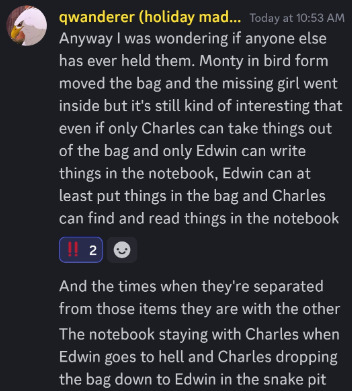
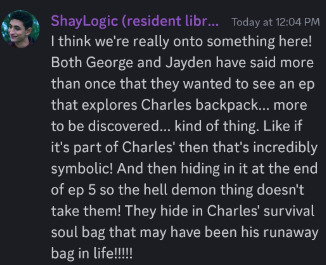

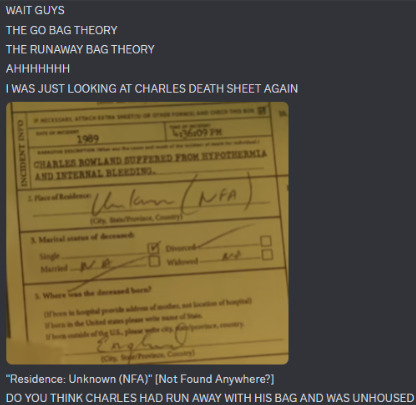
What if Charles ran from home and boarding school and all of it but somehow still ended up with his "friends" at the lake, where he was killed?
@wordsinhaled @dearheartdont
#theories#headcanons#meta#dbda meta#predictions#dead boy detective agency#dead boy detectives#save dead boy detectives#revive dead boy detectives#renew dead boy detectives#text post#charles rowland#bag of trickcss backpack#bag of tricks#complex pocket dimension
162 notes
·
View notes
Note
okay but on top of your davekat post; dave experiences a lot of societal and abusive conditioning too which leads to him being super comphet emotionally constipated dude at first until time passes and he grows, same with karkat but according to his own cultural values. imagine being stuck on a rock for 3 years with your mirror and both accepting each other as you are regardless. either boy could have left each other way the fuck alone yet they got CLOSER during their years together after a clearly rocky start due to working on themselves after being confronted with by each others existence. a huge lesson in self love fr
YOU GET ME.
i think it's really notable how well dave reflects karkat's feelings of like. brokenness. i'm a huge sucker for when davekat fans point out dave's red eyes and him always hiding behind those shades. the colour red with davekat (and terezi but i think she should be allowed to kill both of them with a brick) is really poetic as a symbol of this to me.
to me i think karkat and dave work SO WELL because on some level they embrace the parts they HATE about themselves in eachother. they kind of teach themselves to love the things that they find disgusting when they do it.
like i think they're drastically different people who have been conditioned and hurt in similar ways. karkat being like, moody, LOUD and maternal even while dave is awkward at expressing himself, etc etc . but like, the ways they were forced into these awful and uncomfortable positions by the societies they live in gives them way more common ground than they'd ever expect or admit initially. Which is why they're so damn interesting to think about.
thank you anon [you also have the privilege of being the first person to ask me anything on this account so let it be known my first ask was answered with Davekat
55 notes
·
View notes
Text
There's a few routes in this game that say a lot about how fickle and unstable Takumi can be, that really warps him on an existential level.
It's hard to grasp how sometimes, but I think it starts with this...
Essentially, he's a person whose 'programming went faulty'. Namely, the issue of 'Karua', and how she's at once both a propaganda piece projected into his brain, and also Nozomi's words filtering in.
I don't think he's able to fully separate those things with conviction, as much as he wants to. He doesn't get how projection works, that's already something difficult for a sheltered and clueless teenager to unpack but... this is a whole other level of 'challenge: impossible' mind-fuckery. If the group have ever had some disconnect between their sense of identity and their 'memory', Takumi's is soup.
But what especially gets me, is his 'younger teen self' dismisses 'Karua's' studies in the most incurious way- 'what's this, the outside world? Why bother with all of that? Why do you care? Conspiracy theorist', etc. which I imagine is what he was 'supposed' to do with anything 'weird' like any potential new information. Until the programming got funny at odd moments when Nozomi's interest would seep through, and then, you'd catch Takumi responding to 'Karua's' interest... with more interest for once.
(Now the brain doesn't know what to do. Oh sure, you want to take charge of your destiny, but actually it's better to just sleep and forget it all. Not like you ever cared about learning anything, right?)

I'd say Takumi's avoidance mechanisms later, are a response to Nozomi's existence as if she was a virus. Which... says a lot about the fascist state of the Artificial Satellite, and how Takumi was designed for the 'most ordinary kind of life' that wasn't meant to know it.
It's kind of unclear how the programming works- whether it takes the subject's base personality and uses it to run an 'AI scenario' based upon whatever Kamukura wanted to project into them, or if it doesn't bother matching personality at all and just shoves scenes into their head regardless if it's something they'd do. Either way, it feels that something went especially wrong with Takumi, even if his personality matched the 'memories' he was given, because for the first time one of the pod-programs was actually adapting to outside stimuli.
The symbolism about that moon is especially interesting. Because Eito - the 'moon' - learns the truth about the world and its wars, and remains a significant challenge for Takumi to grapple with- only for him to kill him and redo everything at the end of the first scenario, suggesting he had kind of failed that (basically undoing the work that Eito had done to stop the weapon without knowing that they're not on Earth, for one...). The moon also represents 'illusion'- what the SDU look up at from Futurum is actually the Artificial Satellite where they've spent their whole lives in a pod, Eito's major trauma deals with illusions that physically warp what humans are (the glitch also doesn't even fully distinguish between 'Human' and 'Futuran' in the first place which makes it even less of an objective judgement)...

...on that note, this here from the Casual route continues to haunt me, and it's been hard to put into words exactly why. Because it might very well have come from Eito's mouth if he were there, since he's trapped in some terrible stuff too. But Eito's not there- that's a dream state that Takumi is in, so those words came from Takumi.
It's like his subconscious has been screaming to get out of the cage for a long time, but he keeps wanting to go back in anyway.
#offgame musing#tag: hundred line#takumi sumino#eito aotsuki#nozomi kirifuji#the hundred line#the hundred line spoilers //////#overanalysing as usual I see#if i forgor something go easy pls this game is Huge#general major spoilers beware.#*the 'virus' thing isn't quite... literal... but like habit?#idk how to describe it khdnfkhaskfjh#HL: meta
55 notes
·
View notes
Note
Okay, can we talk about the fact that when Ruby thought she "killed" Oscar, that is when she broke. She just lost it after that. She fell over and you could feel the weight when she hits her knees. It just shows that Ruby really does care for him and if something happened to him, she probably wouldn't be able to go on....
Love and grief are two sides of one coin, and Ruby's fatal flaw is her grief. It is the force that both spurs her to action, and that which is her greatest weakness. This doesn't simply manifest as fighting for those she's already lost (her mother, Pyrrha, Penny, etc.), or fighting to protect those she hasn't lost yet (per her silver eyes: the preservation of life). These aren't just goals or missions; they are the reason she became a huntress in the first place. They are what Ruby Rose is. Except, after all that she has been through by the time she arrives in the Ever After, these foundations that she built her self image upon have withered.
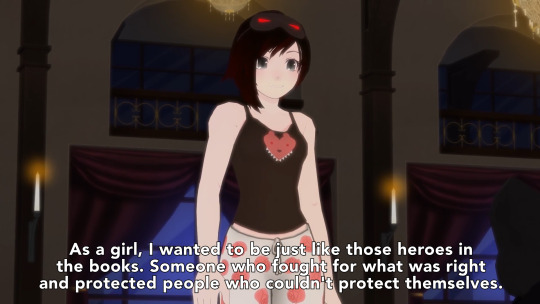
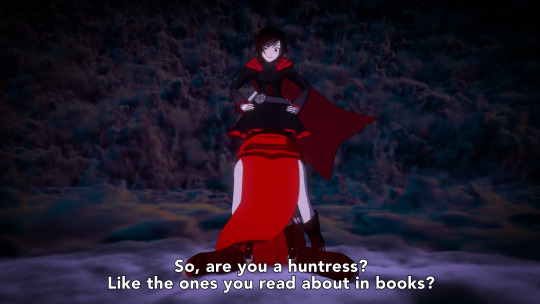
Ruby's desire to honour those she's lost and protect those she hasn't has twisted into a much more insidious thing. A belief that she must save them, that she alone is responsible for it. Except, with every lost friend, with every failure, those fears have taken on greater power over her. They've shifted into the belief that - not only can she not save anyone - but that she is directly responsible for the deaths of those she's lost. That every time she tries to do the right thing, she will just cause more harm than good.
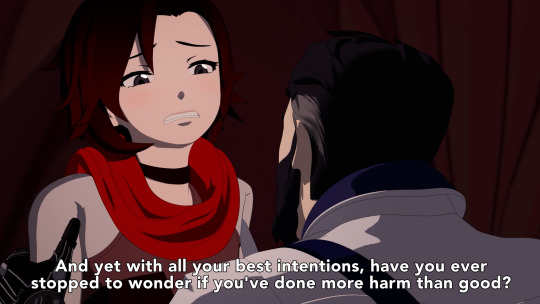
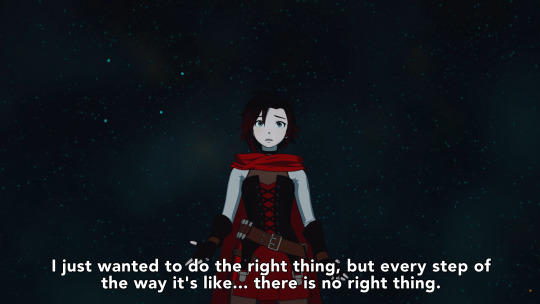
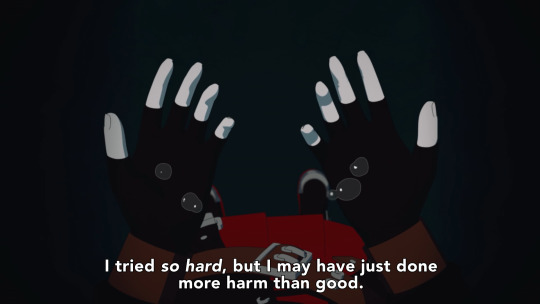
It is a fear so paralyzing, that she becomes unable to lift up her weapon - an extension of her self; a symbol of her identity - at all, lest taking action bring about what she fears most once again.
And then Neo goes and proves her right.
And of course she uses Oscar to do it.
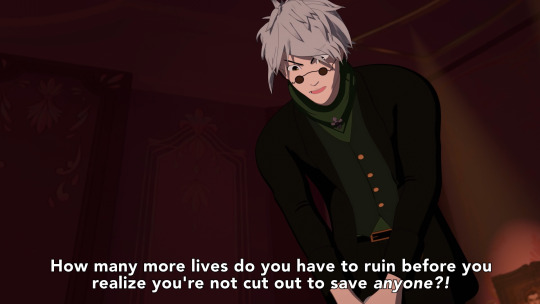
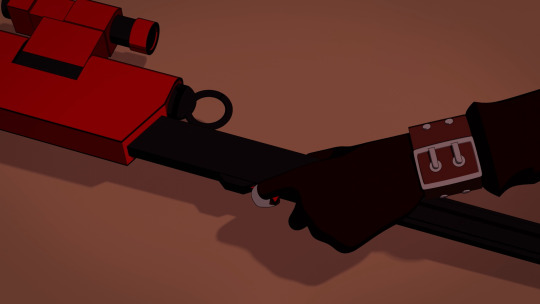
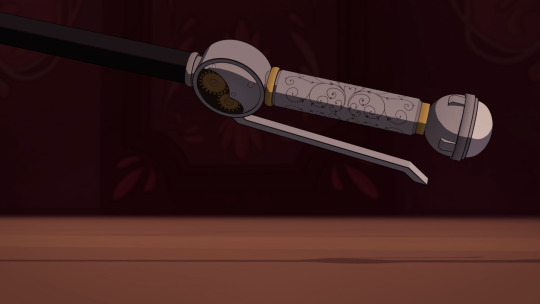
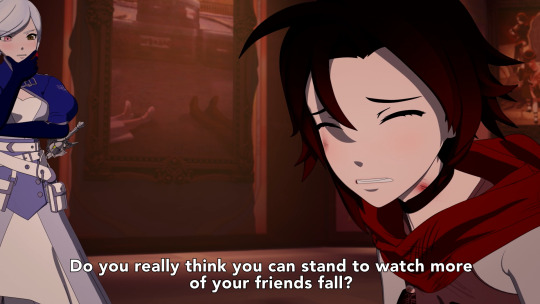
In the Dojo Scene in V5, Oscar is the first - and for a while, only - person to get Ruby to open up and be vulnerable about her fears and the weight of her burdens. He is the only one to see through the façade she puts up before it's too late. That scene kicks off their relationship as something unique, showing us that Oscar is close to Ruby in a way that differs from the rest of the cast. A closeness that only grows with every show of mutual support between them, with every instance of Oscar noticing Ruby struggle where others have failed, and with every moment where their attachments to each other are tested. Also, it's no coincidence the core issue that Ruby bonds with Oscar over in the first place is his fear about the merge: a curse that slowly strips away Oscar's agency, autonomy, and identity.
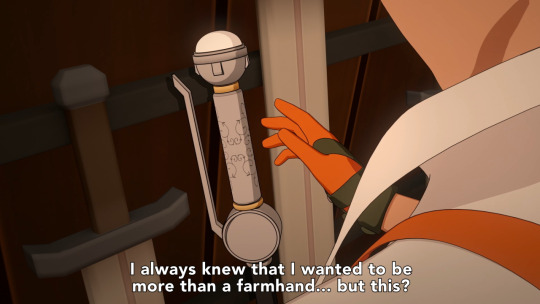
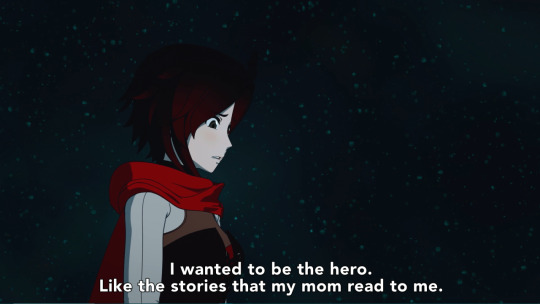
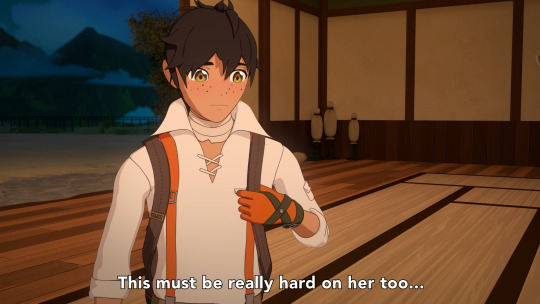
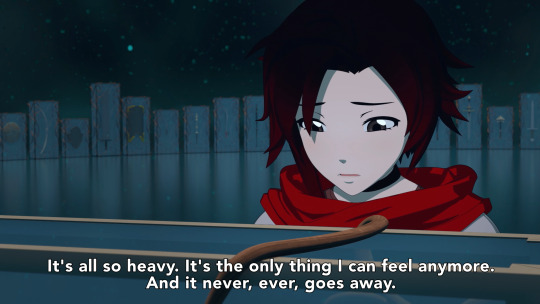
I think I've said before that technically Neo could have used an illusion of anyone's death in the Tea House Scene, but that's not really true. To anyone paying attention, you know what's going to happen before the cane drops. Because Ruby is closer to Oscar than she is with others. Because Ruby is fighting desperately to save those she loves, while being terrified her actions might be the very reason she loses them in the first place. And while Ruby is wandering around the Ever After looking for a way home, Oscar is a world apart from her fighting a curse he is losing himself to; a fate that Ruby has no power to protect him from.
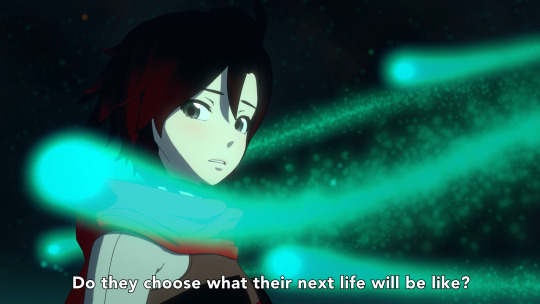
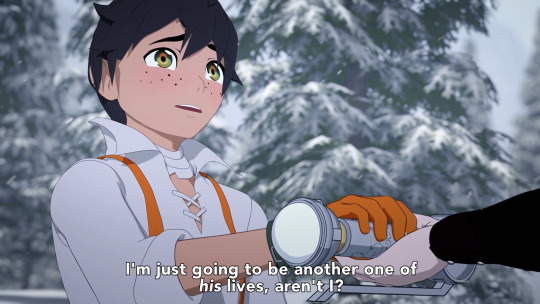
So of course it was an illusion of Oscar's death at her own hand that pushed her to her breaking point. He is the embodiment of her attachments (her greatest strength) and that which she fears losing the most (her greatest weakness), because he is the one she is most likely to lose if she can't win this fight.
It was always going to be Oscar. It was only ever going to be Oscar.
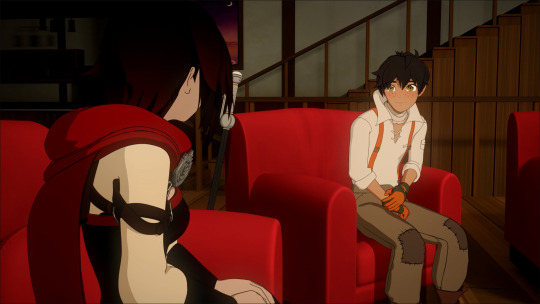
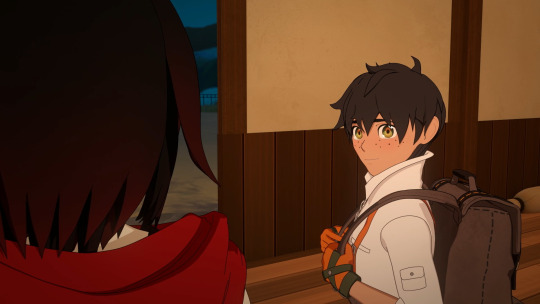
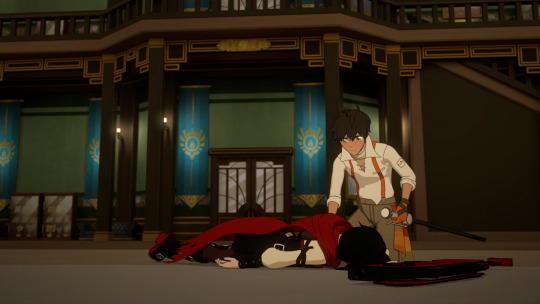
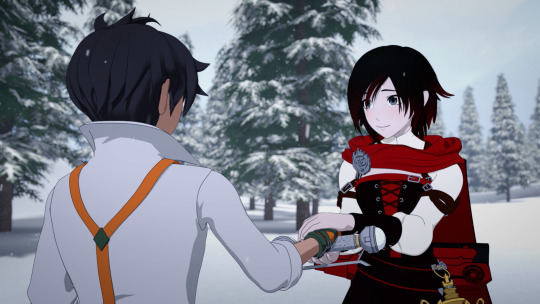
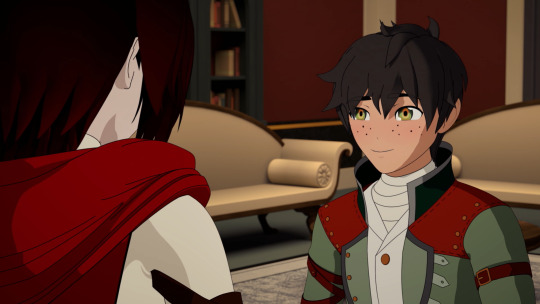
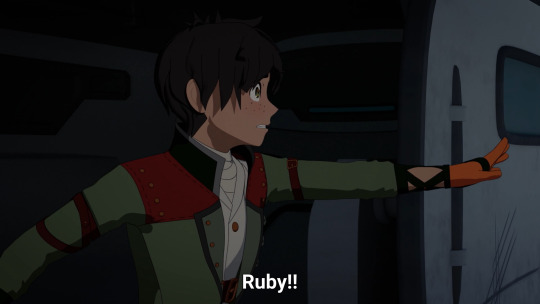
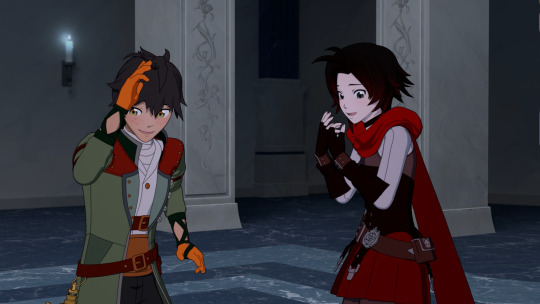
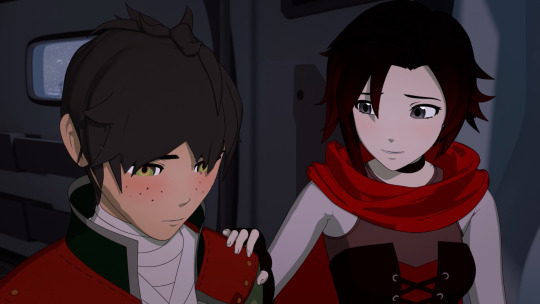
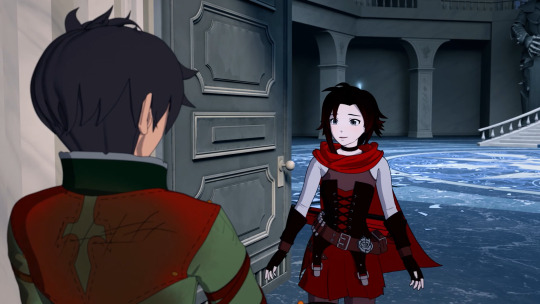
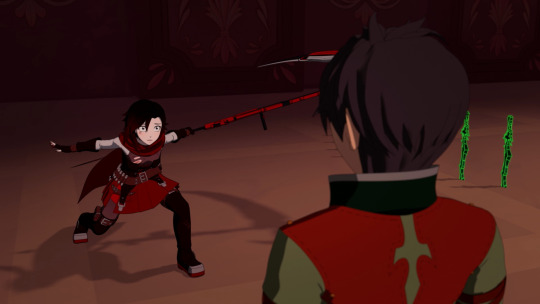
#ask#asks#rwby#rwby rosegarden#rosegarden#meta#analysis#rosegarden412#this meta gave me a lot of grief (pun not intended)#too many layers to this ship i keep getting turned around and struggling to say what I'm trying to say#but like. you get it.#ruby rose#oscar pine
104 notes
·
View notes
Text
X-Men hating X-Force
After their effectiveness tracking Cable and destroying Predator X in Messiah Complex, Cyclops commissioned X-Force as a proactive black ops squad. They handled threats like The Purifiers, The Legacy Virus, Bastion, Marauders, The Right, etc. Anyone with genocide on their mind.

Word got out and many X-Men were horrified to the point of leaving - but why?

Nightcrawler and Psylocke (ironically) figured out something was being kept from them and that Cyclops knew about it. Laura doing a spot of lethal torture tipped them off and Betsy confirmed it telepathically. Kurt, especially, was not happy. He died shortly after, which exacerbated everyone's emotions.


Ugh. Greg Land.
After Second Coming and the defeat of many of the more dangerous genocidal agents, folks had time to think. Despite fighting ten different wars at once with fuck all outside assistance (and definitely none from the state,) certain folks made clear their objections to killing in general. Storm asked Scott what Jean would think and we never get an answer on that one. Jean was dead for this 'darkest hour' period after M-Day though she did join Krakoan X-Force to be 'smart, swift and violent.' The canonisation of St Jean was often used as a symbol and rhetorical device, but I have to wonder how she'd behave in the same circumstances.
Xavier, upon sensing no remorse from Scott, looked at him like a stranger. I guess secret drastic action is only okay when he does it - like The Illuminati, or the secret team that didn't come back from Krakoa, or his entire career. It's not always a bad thing, but it often is. The existence of the Xavier Protocols makes his stance a little hypocritical IMO, and that was plans for killing allies not proven ruthless enemies.
It's easy for him to say 'I never wanted this for you' while admitting he's facing every nightmare scenario at once - a multi-front war of genocide. With stakes like that, how do you not kill people? Victory came with a high cost and was a close thing, without X-Force they definitely would have lost. All mutants dead, but with their conscience intact. Somehow I doubt the kids would find comfort in that.

Storm and Logan are processing Kurt's death and the revelation of X-Force hangs in the air. Logan is full of self loathing, and frankly, Storm is full of shit. Their enemies are genocidal monsters who deliberately target children. The Purifiers have lynched mutants, blown up a school bus, and so much more. Their mission hadn't changed at all - in fact they were escalating and joining Bastion plus every other hate militia for a final attack. The state is unwilling or unable to stop them - waiting around for them to attack again, especially with kids on the island, is suicidal.
Heroes don't kill, except when they do. Most heroes aren't constantly at war without a safety net either. Would it be ethical to be the last mutant alive fighting every threat alone, thinking 'at least I didn't kill anyone' as Nimrod tears your heart out? As The Purifiers crucify Academy X, or the Sapien League releases the Legacy virus mark 3? I don't think so. None of them want war, but war wants them.

Hank, of course, leaves. Now that most of the extinction threats are gone he can hang out in Avengers Tower or chill at home without being worried about a robot from the future killing him or his remaining putative students.

I don't say this very often but Namor is right. Fuck Hank's conscience. He's no stranger to opting out of mutant affairs, and in a different story that'd be a viable choice. The X-Men exist in a world of heroes where an endless parade of very dangerous entities specifically want to kill them all. They act as heroes often, but are they actually allowed to be? I'd say no. Especially post M-Day, every threat to mutants is a genocidal one - a war.

Could X-Force have been better? Of course. Would it be nice to have the luxury of traditional superheroics or pursuing a normal life? Definitely. Would the world be better off without X-Force? Depends on whether you value mutant lives. In the sixties, X-Force would be considered a Brotherhood of Evil Mutants. As a long running franchise the X-Men's enemies experienced power and motivation creep to the point that they're at war no matter what they do. Ethics are nice to hold onto, but so is breathing. So are the lives of children in your care. If they waited they'd be dead, so these mutants may not like X-Force, but they should probably say a prayer to it for removing the threats that would destroy the school (again) and everyone in it
Scott's assessment is pretty accurate here. Unlike The Avengers, The X-Men aren't a government sponsored team - the government frequently tries to wipe them out. Unlike the Fantasic Four, the X-Men are mostly despised by the public. The other super teams are fickle allies at best.
They've always been a team with a school, and a school means children. How many children need to die before a policy of reactiveness becomes naive? How many genocide attempts or successes before you classify it as a war? The Avengers fight Kang or Ultron or whoever and that's great for them. The X-Men would be helping if they weren't attending funerals, raising mutant children because nobody else will, and fighting for their lives against the countless parties who want every single mutant dead. They don't get the choice most of the time, and when they do it's often because there're other mutant teams doing what they won't.
If the narrative wants to convince me that lethal proactivity is unethical, including unwavering enemies that won't stop until all mutants are gone was a mistake. Putting Norman Osborn in charge of national security, who included mutant existence as a threat to that was a mistake. But they did, and we all have to play the hand we're dealt.
Many of the mutants who objected to X-Force were powerful or well-trained enough to protect themselves non-lethally. What about those who aren't? The X-Men came to the Morlocks' rescue, but it's called the Mutant Massacre for a reason. In a story where endless forces want every mutant dead - which becomes more true every year - fighting a limited and bloodless reactive war is a luxury.
78 notes
·
View notes
Note
Hi there! Not sure if my message was eaten by Tumblr. I love your art with Robin and Batman hugging it out against Batman's demons. You said that you have a head canon inspired by multiple comics that Bruce lives with mental illness — coping with symptoms like hallucinations all while trying to make the world a better place. I was wondering what comics those are and what mental illness you think Bruce has? I would love to check them out! Thanks ✨️✨️
Thanks for the ask, anon! And thank you for your kind words on the Batman and Robin mental illness-related art. This is such a compelling topic… here are our personal recommendations for Bruce Wayne and Wayne Family mental health-related comics. We’re sure we’re missing some -- in which case, we’d love to hear folks’ suggestions!
Bruce Wayne mental health-related comics:
-Arkham Asylum: A Serious House on Serious Earth (1989)
-Batman: Ego (2000)
-Batman: Failsafe (2023)
-Batman: The Imposter (2021)
-Batman: Shadow of the Bat/The Last Arkham (1992)
-Dark Nights: Death Metal (2018)
-The Batman Who Laughs (2018)
-The Killing Joke (1988)
-Batman: Legends of the Dark Knight #27 — “The Destroyer” storyline (1992)
-Batman: The Brave and the Bold, Vol 2, #4 (2023)
For Wayne Family mental health-related comics:
-Flashpoint: Batman Knight of Vengeance (2011) – for Thomas and Martha
-Justice League Vol 2, #25 (2014) – for Thomas Jr./Owlman
-Batman and Robin (2009) and The Return of Bruce Wayne (2010) – for Wayne Family in general
Keep reading if you’re okay with being a little spoiled on mostly old comics excerpts. Or if you want to skip ahead to what mental illness(es) we think Bruce has, scroll down to the very end, which is section 6!
Arkham Asylum: A Serious House on Serious Earth (1989)
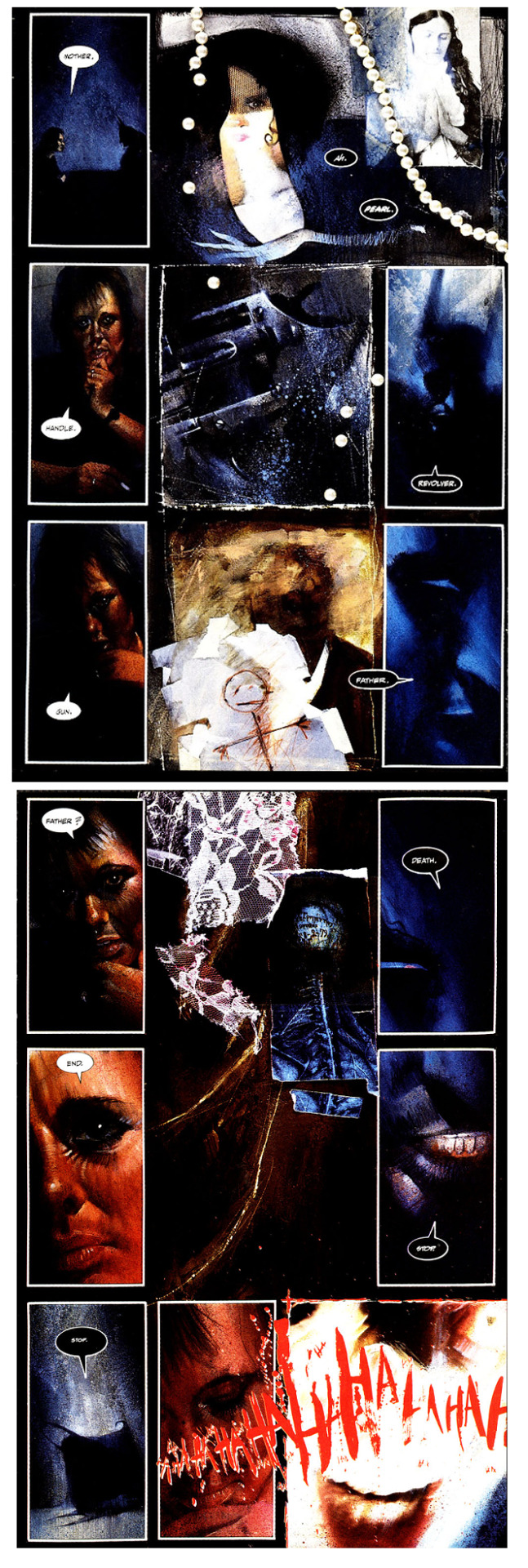
This is our top recommendation for Bruce and mental illness related comics. It’s disturbing, plumbing the trauma around Bruce’s parents’ deaths, his fear of “sickness”, and how his Gotham villains are symbolic of his own inner demons. It’s also one of the most psychological stories — the other comics have Bruce compromised by injuries/toxins, etc., but this is just plain old bad therapy.
2. Batman: Ego (2000)
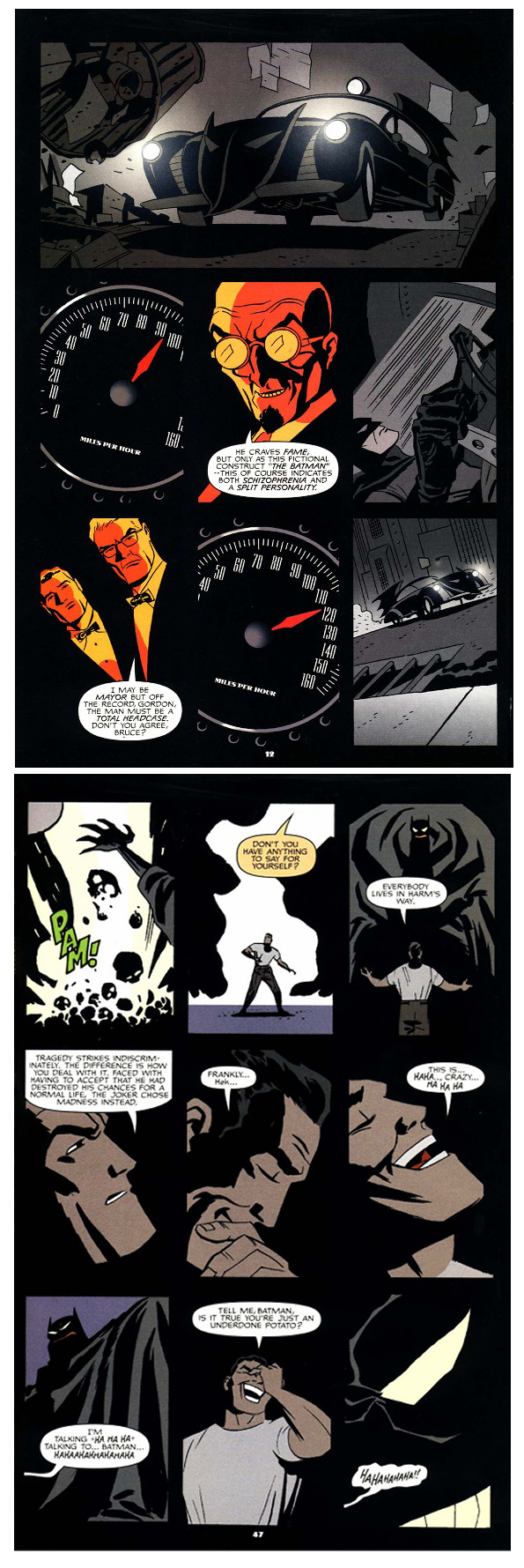
Another top recommendation with great art from Darwyn Cooke. Warning: from here on out, Bruce is going to be blurrily “crazy” or compromised by villains — we read any instances where he questions his sanity as opening up readings for mental illness. Here, Bruce hallucinates a Batman who taunts him about his guilt and fear — it’s a fascinating read.
3. Batman: Failsafe (2023)
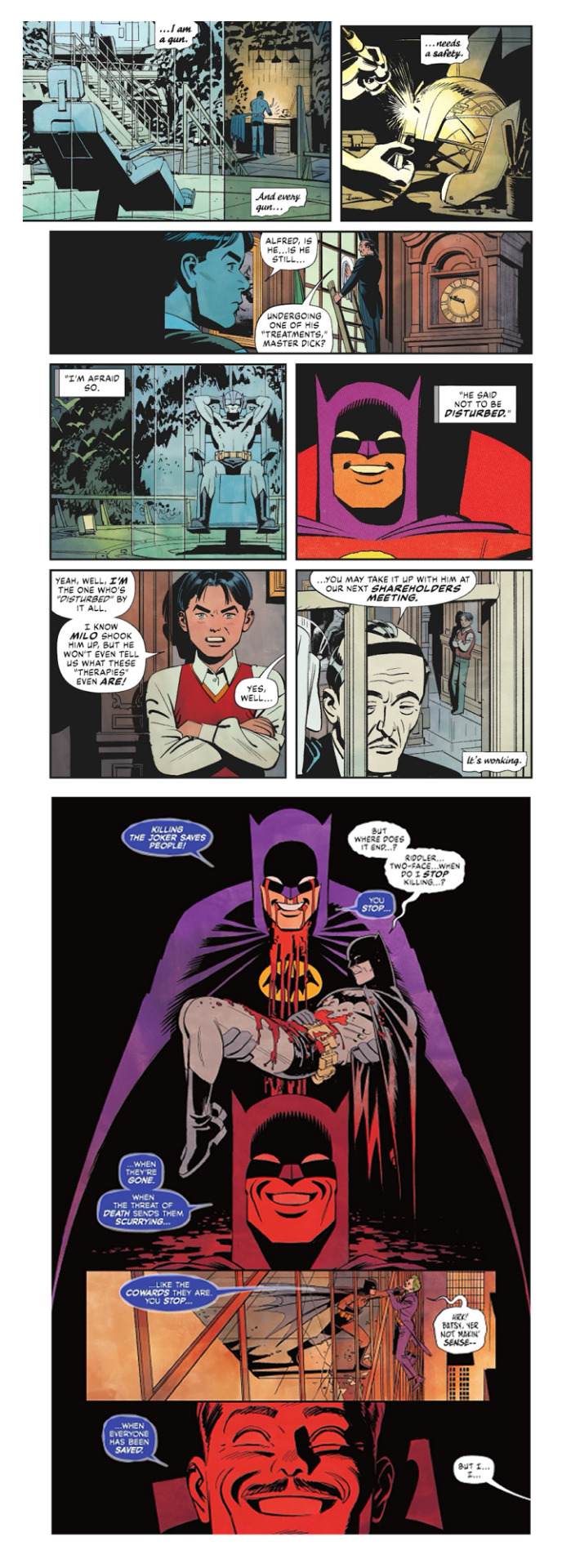
This is a great comic about Bruce’s self restraint and his view of himself as something dangerous — in his words, “I am a gun.”
4. Batman: The Imposter (2021) - Batman: The Brave and the Bold, Vol 2, #4 (2023)
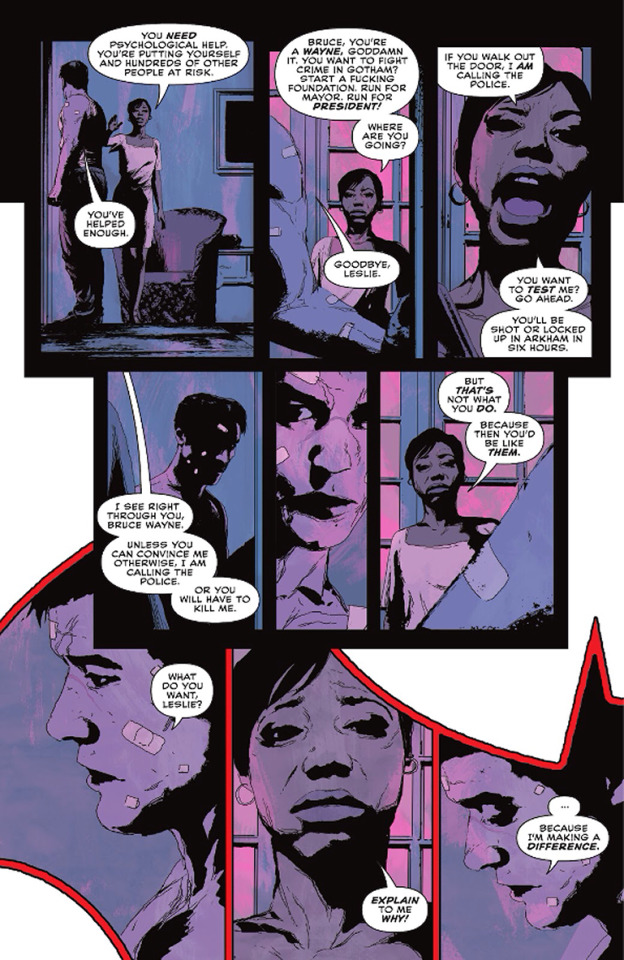
The other titles continue to explore the perennial threat of Bruce in Arkham, his fear of “sickness,” and we get some talks with Dr. Tompkins in the Imposter title. They’re not as dramatic as the top three recommendations but they continue to push a narrative that Bruce is haunted by (untreated) mental illness.
5. Wayne Family and Mental Illness
Now, in our ideal comics world, we could read the above Bruce-centered comics within the context of the Wayne Family’s struggles with mental health. This isn’t to be biologically essentialist or to say DNA determines destiny. But it would nicely build into the existing canon theme of Bruce wrestling with his family legacy. In this case, he wouldn’t just wrestle with his canonical duty to the city as an inheritor of old money, but also as an inheritor of mental illness.
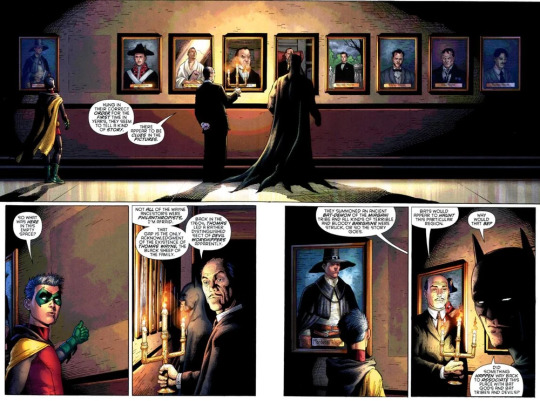
The Batman and Robin 2009 run goes into detail about Bruce’s devil worshipping ancestors, and the Return of Batman 2010 issues show there are even witch hunters in the bloodline. We recommend reading those comics — you could google titles for Dr. Hurt, the mad first Thomas Wayne (maybe — or he’s a dark god or his father or…). We also highly recommend Batman: Legends of the Dark Knight #27, which shows how Bruce’s ancestor, Solomon Wayne, channeled his fear of devilish forces to turn Gotham into a fearsome, gargoyle-filled city. Bruce’s own parents show signs of mental illness in the Flashpoint comics. Said comics cast Thomas Sr. as a cut-throat Batman (making one think of those associations between surgeons and sociopaths) and Martha Wayne as the Joker. It’s what the 2022 Robert Pattinson film references with Martha’s mental illness. Personally, we LOVE the idea that Thomas and Martha have mental illnesses — it gives their philanthropy and their tortured relationship with Gotham so much more complicated depth.
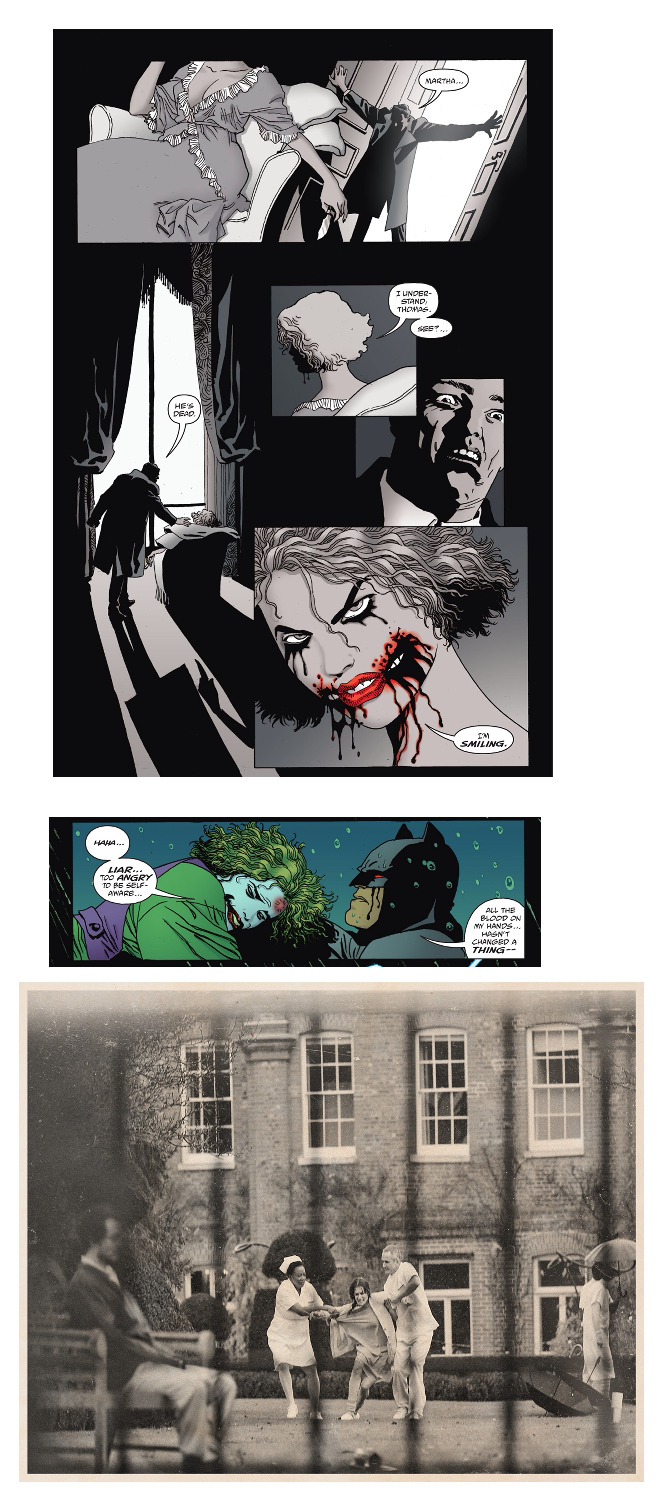
Lastly, there is Thomas Jr., Bruce’s sometimes older brother who almost goads Bruce into murdering their parents in another universe. Thomas Jr. is the evil Owlman or the Boomerang Killer depending on the earth we’re in. Following the logic that there’s some fidelity between universes — it wouldn’t be meaningful to confront an evil alter ego unless they reveal some inner demon you’d been trying to hide — Thomas Jr. brings up some interesting questions about mental illness with the Wayne brothers. We have plans for a story exploring a gothic Wayne Family in which Thomas Jr. and Bruce grew up with a meaningful somewhat horrific childhood relationship — in the meantime, we’d recommend checking out Thomas Jr. in the Forever Evil comics!
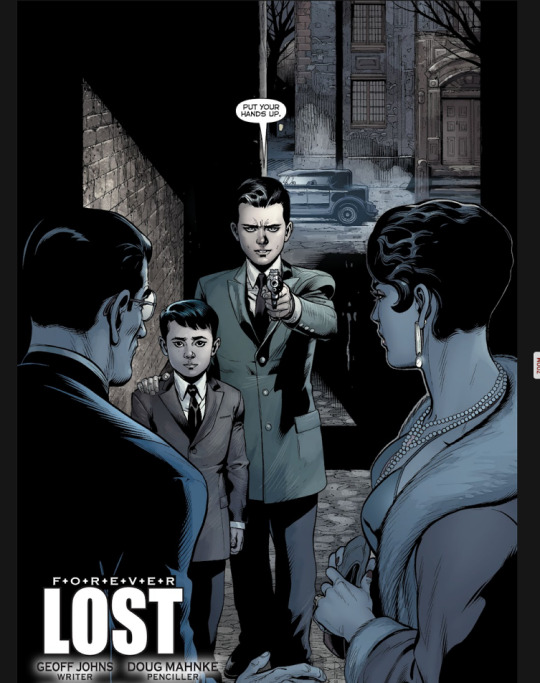
6. What Mental Illness(es) Does Bruce Wayne Have?
These comics open doors for reading several mental illnesses into the Wayne Family and Bruce in particular. PTSD certainly comes to mind — schizophrenia has also been name dropped as well as Dissociative Identity Disorder (called “split personalities” in Batman: Ego). Sociopathy is also alluded to, and the Joker taunts Bruce about being attracted to boys in a “sick” queer way.
We think there’s validity to the first few readings — not necessarily the sociopathy or the pedophilia. Personally, we’d like to read and write Batman stories that depict Bruce wrestling with PTSD as well as schizophrenia inherited from his mother. It fits our interests in family dramas, mother-son relationships, and humanizing depictions of female characters with mental illness. Regardless of the mental illnesses a Batman storyteller explores, they can do it in a nuanced and sensitive way. That’s not, admittedly, the MO in a lot of sensationalist and often ableist comics. But Bruce Wayne is a character who especially invites readings of mental illness — and showing him cope with mental illness while being a hardworking and empathetic hero could be inspiring for many readers, including us. That’s why we’re working on more Bruce Wayne, hero with mental illness-related stories and art we’re hoping to share soon!
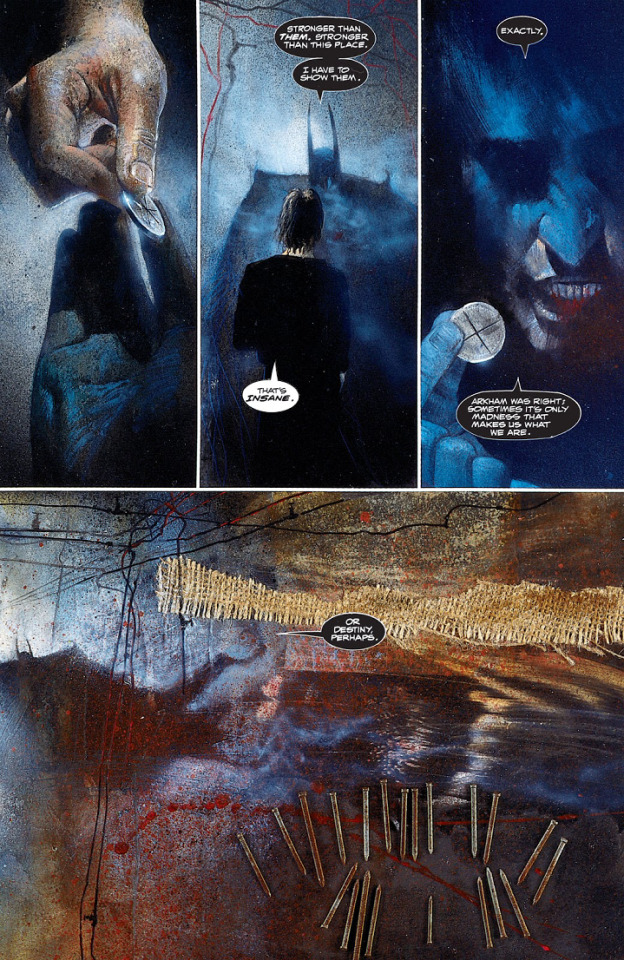
Hope we could offer a few titles you haven’t read or re-read yet, anon! And thanks again for reaching out — we love getting messages from y’all about comics/media. Again, if anyone else has recommendations for Batman mental-illness related stories, feel free to comment or send a message!
84 notes
·
View notes
Text
watching the entirety of jrwi: riptide again. here's some important things from the first few episodes that I feel we forgot (<110 mentions too though)
Jay
Had night terrors similar to those of Kubakinta's curse in episode 5, and they eventually start returning even after Loffinlot's curse is lifted ○ All of them were about her family and/or the navy ○ I simply think people leave her out of the nightmare stuff and she deserves it. Hurt her more, please (he said, lovingly)
was actually very upset at having to use her medal to get a Loffinlot rebellion to shut up ○ This could be because she didn't want them to guess she was a spy, but I choose to believe it's because she felt guilty
"If you're gonna be sailing with someone, you should have a good relationship with them. [nervous chuckle]." She says, while asking him for information about the Black Rose Pirates (ep. 10)
Said "thank god they didn't find me" after a nightmare about the navy attacking. Even when she was supposedly a spy, who one day would have to return to the navy ○ Very unclear if she was scared of her dad, or if it's because she was a secret spy so the navy would've just killed her
Rewatching, she was suspiciously into the plundering and gold and stuff. Like that was real sus. It doesn't fit her current character much
The only one among them who's gambled before
Chip
The entire thing literally starts off with Bizly holding a lit match
Called Gillion "Gill" and Jay "Sureshot" from an early stage
Was SO much more of a bastard. Lied to Gill constantly, didn't care about anything but the money, etc.
Had aggressive hand tremors alongside Jay's night terrors ○ Gill cures it with lay on hands
When he gets drunk married, they talk extensively about how he'd be released when he's dead. Welp.
They did actually break up and it was fine and they were still friends. They parted on good terms
Is really fucking good at chess ○ Beat Earl twice and Jay once. Jay had a point of exhaustion after a nightmare but Earl had no excuse ○ Lost to Gillion though, but only cause of prophetic screwup ○ This kid is smarter than he lets on, y'all
Was the first one to have a backstory dump while Jay is asking him about the Black Rose Pirates, yet still we know jack shit about his life before them other than "orphan"
Gill
Charlie has referred to Gillion with 'they' many times. I can pull receipts.
When describing Gill, Charlie said: "He's more.. elven, if you had to make a comparison. 'Cause I don't wanna be a fish guy". Oh, honey.
Smote a bald person by using his hair as a whip (ep. 4)
Was given anxiety and self-doubt alongside jay's night terrors and chip's tremors ○ "What do you want?" "I want the feeling of satisfaction I've been chasing my whole life." ○ This was episode FIVE.
First mention of the prophecy and how Gillion wasn't their ideal student is ep. 7, after he divine smites + prophetic screwups and deals like 60 damage to some beetles ○ Chip spends the next 30 seconds in gay awe
He refers to the crescent moon Niklaus tattoo as "my zodiac" (probably a bit) ○ It's not a lil basic white girl moon this thing is the entire size of his forearm
Gill had never heard about the Black Sea - it's unclear if the Undersea just don't know, or if that's just how sheltered he was (ep. 10)
Biz: "What would Gillion do. If he just had no goal - was just sitting there." "Gillion always has a goal." "Would his goal ever be to just.. Sit there?" "Absolutely not." ○ Later, Chip expresses that he doesn't know what Gillion likes. What he would want out of winning a bet. Gillion doesn't have an answer
Other
Apple, in a couple of early battles, acted like Gill's familiar (see: ep. 7)
They also pecked at his Niklaus tramp stamp and looked all confused at the idea of eating seeds
The specific crescent of the moon in the Niklaus tattoo is known as a symbol of "corruption" (ep. 9) and its antonym is the sun, for "life", similar to the yin and yang ○ Interesting to consider after what the tree said in 110 <_<
Pretzel has a masters degree in couple's therapy (ep. 10)
The Albatross/Millennium Chipper was described as the colour of rosewood or mahogany
Captain Lizzie's first introduction was a wanted poster, and Chip wanted to turn her in for the prize, then decided to try learn from her instead
Chip/Bizly called Old Man Earl "Erol" for a loooong time ○ Maybe it's an accent thing but I have an uncle called Erol and so this stands out to me
#I have lots of thoughts about all of this#jay also got her gun in like ep 1 but didnt use it for ages#idk. it's unclear with the combat in the beginning. she just says “shoot”. i love her anyway#jay the kinda girl to have a “no boys” sign up but then when she meets chip and gill she changes it to “son boy” like that one meme#theyre all my favourite character#not art#jrwi riptide#jrwi show#jrwi jay#jrwi chip#jrwi gillion#jay ferin#chip bastard#gillion tidestrider#jrwi#just roll with it#just roll with it show#just roll with it riptide
640 notes
·
View notes
Text
So I had this type of idea for Stage 4 for awhile now, heavily inspired by a non-utmv fanfic I read before. I bounced a lot of ideas off people in real life and some online, so there was some tweaking and adjustments over the time.
Stage 4 believing that if no one tells it to eat or offers it food, it’s because They don’t want it to eat. And so it must earn a reward.
It will only allow itself scraps of a reward (food, rest, shower, anything it thinks it needs) if a mission objective is fulfilled and the scene is marked. When a mission is completed and marked, it is allowed more and bigger rewards.
And it is only ever allowed rewards if it marks the mission as completed—such as carving or drawing an upside down heart on the victim, the scene, or its own body. The upside down heart is to represent Stage 4–that it did this and earned all the rewards—and affirm its mirroring of Chara.
A mission objective is possibly killing a target. Higher targets such as Frisks, Boss monsters, etc have names and higher rewards and punishments.
For example: Boss Monsters like Asgore, Flowey/Asriel, and Toriel could be called Command Objectives or considered Primary Targets. These figures symbolize the core of the world’s structure and power, and their destruction would be considered the ultimate display of obedience and power.
When it manages to kill these targets, Stage 4 could sense it’s earned an immense reward akin to a massive surge of energy.
This could mean it is allowed to binge on a full meal, which Stage 4 would only reserve for the highest-value targets. The meal could even be tied to something symbolic, like eating after erasing/killing Asgore as if its feeding on the defeated world itself.
Stage 4 could even delusionally believe that with each Command Objective kill, it unlocks a new skill or becomes physically more powerful, further feeding into its belief that its advancing toward its ultimate mission.
Stage 4 could even experience a brief moment of clarity or relief—the constant feeling of being watched or judged might lift temporarily, as though They are momentarily satisfied.
Failure to kill a Primary Target would result in severe punishment in Stage 4’s mind. It could deny itself food or any form of reward for an extended period, refusing to eat or do anything until the target is successfully eliminated.
Stage 4 could resort to self-harm, carving more intense or larger marks into its body as punishment, believing that it hasn’t earned the right to exist if it can’t complete such an important objective.
And the of course there’s the Personal Objective—Papyrus. Although Stage 4 will never think of it by name.
Killing Papyrus would carry extreme emotional weight, even if Stage 4 is emotionally disconnected, and the rewards would be specific to the psychological and emotional significance of the kill.
The Personal Objective is a target that transcends mere violence and ties into Killer’s identity and past as Sans. Stage 4 could view Papyrus as an “Impossible Target” due to Killer’s emotional baggage, even if it’s buried under layers of detachment.
If Stage 4 successfully kills the Personal Objective, it might interpret it as the final step in severing its connection to Sans entirely. The reward might not be physical, but a feeling of emotional void, as though Stage 4 has finally completed the process of becoming something separate from Sans.
Upon completing this objective, Stage 4 might mark itself in a specific way—perhaps carving an inverted heart directly where its own SOUL is, symbolizing that it has eradicated its deepest connection to its former self. This could become a ritual in which it leaves a permanent, highly visible mark as a trophy of its success.
After killing the Personal Objective, Stage 4 might grant itself a particularly significant meal, as if the kill has earned it a chance to feast without restriction. It could view this as a form of final reward for overcoming its hardest, most personal challenge.
Even though Stage 4 might not recognize the emotions associated with guilt, it could manifest as a deep, unsettling feeling of failure. If it fails to kill the Personal Objective, Stage 4 could physically punish itself in a much more severe way, such as carving larger or more intense marks into its body.
The delusion of being watched could intensify, making Stage 4 believe that They are forcing it to relive its failures, torturing it with images of the Personal Objective still being alive and mocking its inability to complete the mission.
Characters like Undyne and Mettaton provide a lot of EXP and are crucial for increasing LV (Levels of Violence). Killing them could be viewed as crucial for Leveling Up and advancing toward its ultimate goal.
Stage 4 could refer to these characters as Leveling Targets, recognizing their role in helping it gain power and EXP. Their purpose is to be eliminated so that Stage 4 can continue rising in LV and fulfill its larger mission.
Each kill could be perceived as granting an instant boost to its Level of Violence, further solidifying Stage 4’s sense of power and purpose. This could lead to Stage 4 feeling physically stronger and more capable after each kill.
After killing a high-EXP figure, Stage 4 might allow itself to eat a moderate meal, seeing it as a functional reward to keep itself going. It wouldn’t be as grand as killing a Primary Target, but enough to keep it sustained as it continues its mission.
Failing to kill these high-EXP targets would result in self-imposed hunger and a belief that it’s becoming weaker, as though not killing them is preventing it from reaching its full potential.
Stage 4 could experience a form of self-doubt, believing that it’s failing in its mission if it can’t eliminate Leveling Targets efficiently. This doubt could manifest as an intensified feeling of being watched, with Them seemingly disappointed or angry.
Stage 4 might cut deeper marks into its body after each failure, believing that it needs to pay for its mistakes.
Food becomes the ultimate reward, and if it doesn’t perform, it withholds it from itself, leading to starvation and physical weakening.
It might feel as though They are punishing it mentally by forcing it to relive moments of failure, experiencing the scorn of its observers.
And of course, saving the most important for last, the Star. Frisks, or an AU’s equivalent of a Frisk.
A world’s Frisk, or an AU’s Frisk-equivalent, with the ability to Reset the world if they possess more Determination than Stage 4, holds immense importance in the hierarchy of Stage 4’s objectives.
In fact, such a character would likely represent Stage 4’s greatest threat, as they hold the power to undo everything Stage 4 has worked for, rendering all its actions meaningless.
This would directly challenge the rigid control and sense of purpose Stage 4 adheres to, making these figures crucial targets in the broader mission to erase timelines.
The Star would rank among the highest-priority targets, given its ability to Reset and undo everything. In Stage 4’s mind, the Star’s mere existence jeopardizes its mission to erase the world or timeline, making it a special and crucial enemy.
While Boss Monsters and high-EXP figures serve as important stepping stones, Frisk (or their equivalent) would be the ultimate objective. Failure to neutralize the Star means the entire timeline can be undone, so eliminating it becomes a matter of necessity.
Stage 4 would view the Star as the embodiment of the Player’s influence or the timeline's refusal to die. The Star holds onto Determination, a power Stage 4 feels belongs only to Them. The Star’s Determination would be seen as a corruption that needs to be eradicated.
In Stage 4’s mind, the Frisk figure could represent the final test of strength—the one obstacle that can still defy the mission’s completion. Killing them would be the ultimate sign that Stage 4 has won, taking full control of the timeline.
The rewards for successfully eliminating the Star or its equivalent would be extraordinary, as this would be seen as securing control over the entire timeline and ensuring no future interference with the eradication process.
The significance of this kill would go beyond just one meal or mark; it would represent a massive psychological victory for Stage 4.
After killing the Star, Stage 4 might finally allow itself a massive reward—perhaps a large, ceremonial meal or months of rest—something it perceives as the ultimate prize for ensuring the timeline remains erased. This would symbolize the culmination of all its work.
Stage 4 could develop an almost delusional sense of invincibility after killing a Frisk-equivalent.
Since the Star is the embodiment of Resets, its death might convince Stage 4 that it has escaped the cycle of resetting and perhaps now is beyond the reach of even the Player's interference. (Of course this is temporary. Because its mission is never ending, and there will always be another Star to kill.)
In killing the Star, Stage 4 might feel as though it has gained complete mastery over the timeline or world, believing that the absence of the Star’s Determination grants it absolute dominion over the timeline. And no one can hurt it again, no one can hurt anyone.
Failing to eliminate the Star would likely feel like the ultimate punishment for Stage 4. The timeline being Reset would reinforce the idea that it’s trapped in a cycle of futility, rendering all of its violent acts pointless. This would have a massive psychological impact on Stage 4.
Stage 4 might feel as if it’s doomed to repeat its mission over and over, with the Star undoing everything, resulting in the ultimate form of punishment—being caught in a loop with no resolution. This would likely lead to escalating self-harm or intense starvation.
The sense of being watched or judged would intensify to the point where Stage 4 could believe everyone is Them, including the Star. The Reset would exacerbate Stage 4’s paranoia, making it feel as though it is under constant, mocking scrutiny.
Failing to kill the Star would mean absolute denial of food or other rewards. Stage 4 would feel that until the Star is dead, nothing it does matters, and it isn’t worthy of any reward. It could starve itself, refusing sustenance until the mission is completed.
The presence of a Frisk-equivalent in a world where Stage 4 is operating introduces the ultimate challenge to its mission.
These individuals would represent the final barrier to erasing the timeline entirely, and killing them would be seen as the greatest victory.
The concept of Reset would become an obsession for Stage 4, pushing it to ensure that no one—especially a figure as Determined as the Star—could ever interfere with the end of the world.
Rewards would be monumental, and punishments for failure would be equally harsh, driving Stage 4 to approach this final task with a cold and calculating sense of purpose.
Reaching certain levels in stats—such as 9 on everything—could even be enough to warrant 9 minutes of rest, or even 9 hours or days of rest if it’s something as massive as having destroyed 9 timelines in succession.
#cw eating problems#cw delusion#cw paranoia#cw self destruction#utmv#sans au#sans aus#killer sans#killer!sans#killertale#undertale au#bad sanses#undertale aus#bad sans gang#nightmare’s gang#killertale sans#undertale something new#something new au#something new sans#undertalesomethingnew#undertale player#killer and chara#something new chara#chara au#killertale chara#something new!chara#kc chara#utmv headcanons#killer sans stages#stage 4!killer
135 notes
·
View notes